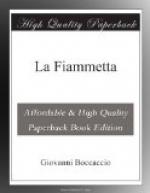Mainly through his intimacy with the spiritual mind of Petrarch, Boccaccio’s moral character gradually underwent a change from the reckless freedom and unbridled love of pleasure into which he had easily fallen among his associates in the court life at Naples. He admired the delicacy and high standard of honor of his friend, and became awakened to a sense of man’s duty to the world and to himself. During the decade following the year 1365 he occupied himself at his home in Certaldo, near Florence, with various literary labors, often entertaining there the great men of the world.
Petrarch’s death occurred in 1374, and Boccaccio survived him but one year, dying on the twenty-first of December, 1375. He was buried in Certaldo, in the Church of San Michele e Giacomo.
That one city should have produced three such men as the great triumvirate of the fourteenth century—Dante, Petrarch, Boccaccio—and that one half-century should have witnessed their successive triumphs, is the greatest glory of Florence, and is one of the most notable facts in the history of genius.
We quote once more from Symonds: “Dante brought the universe into his Divine Comedy. ‘But the soul of man, too, is a universe’, and of this inner microcosm Petrarch was the poet and genius. It remained for Boccaccio to treat of daily life with an art as distinct and dazzling as theirs. From Dante’s Beatrice, through Petrarch’s Laura, to Boccaccio’s La Fiammetta—from woman as an allegory of the noblest thoughts and purest stirrings of the soul, through woman as the symbol of all beauty worshiped at a distance, to woman as man’s lover, kindling and reciprocating the most ardent passion; from mystic, stately periods to Protean prose; from verse built up into cathedral-like dignity, through lyrics light as arabesques and pointed with the steely touch of polished style, to that free form of speech which takes all moods and lends itself alike to low or lofty things—such was the rapid movement of Italian genius within the brief space of fifty years. So quickly did the Renaissance emerge from the Middle Ages; and when the voices of that august trio were silenced in the grave, their echoes ever widened and grew louder through the spacious time to come.”




